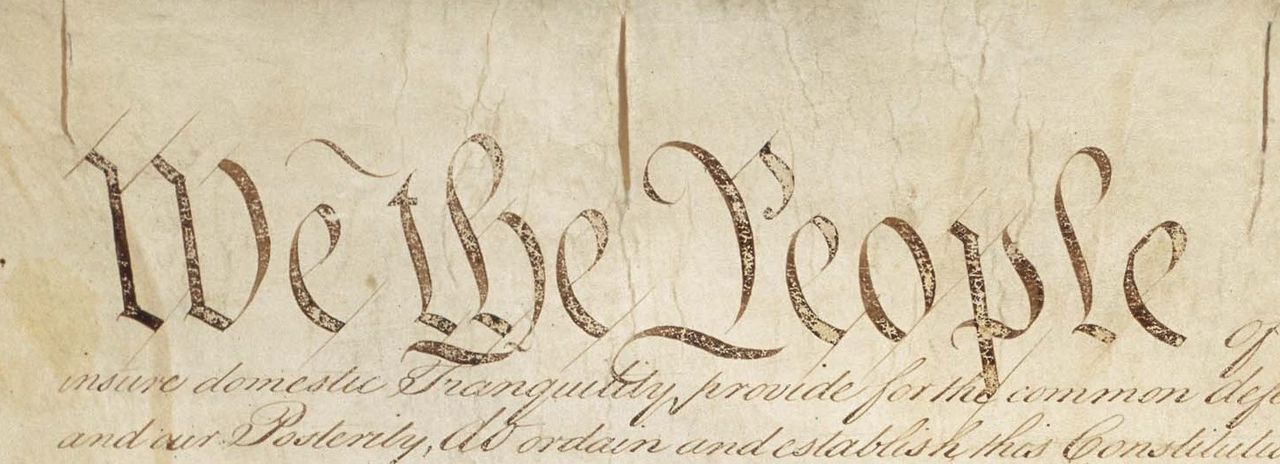Radical Plan To Scrap U.S. Constitution
State legislators support constitutional convention, banning all deficit financing.
State lawmakers in Wisconsin are seeking to pass a resolution that calls for a convention to make drastic changes to the U.S. Constitution. If enough states join this effort, delegates to such a convention could have wide-ranging authority to make amendments to the constitution with very little in the way of external controls on what they are enabled to do.
The idea of a Constitutional Convention sounds far-fetched. After all, the last time there was a similar convention was in 1787, when delegates who were charged with amending the Articles of Confederation instead wrote an entirely new government document. But groups like the American Legislative Exchange Council (ALEC) are pushing for a convention, and in the past few years several states have adopted resolutions calling for one. Resolutions in 34 states are needed for a convention to be called, and so far 29 states have passed some version of a resolution.
There are two major problems with calling a Constitutional Convention. First, there would be almost no limit on the ability of the convention to make wholesale changes to the U.S. Constitution. The convention could write its own rules. As the Center for Budget and Policy Priorities put it:
The Constitution provides no guidance whatsoever on the ground rules for a convention. This leaves wide open to political considerations and pressures such fundamental questions as how the delegates would be chosen, how many delegates each state would have, and whether a supermajority vote would be required to approve amendments. To illustrate the importance of these issues, consider that if every state had one vote in the convention and the convention would approve amendments with a simple majority vote, the 26 least populous states – which contain less than 18% of the nation’s people – could approve an amendment for ratification.
The convention could also choose a new ratification process for changes made to the Constitution. Right now, the approval of 38 states is needed to enact any amendments to the Constitution. But the convention could completely re-write the approval process; for example, a convention might take the states out of the approval process entirely and instead require a national referendum.
The second major problem with calling a Constitutional Convention is that proponents want to use it to pass a balanced budget amendment to the U.S. Constitution. Even if there were a way to limit the changes that a Constitutional Convention can make – which there isn’t – this amendment alone would do substantial damage. According to CBPP:
By requiring a balanced budget every year, no matter the state of the economy, such an amendment would raise serious risk of tipping weak economies into recession and making recessions longer and deeper, causing very large job losses. That’s because the amendment would force policymakers to cut spending, raise taxes, or both just when the economy is weak or already in recession – the exact opposite of what good economic policy would advise.
In a false analogy, proponents of a balanced budget amendment to the U.S. Constitution often argue that families have to balance their budgets and the federal government should do the same. But in fact, families often borrow to make worthwhile investments – taking out a mortgage to buy a home, for example, or getting a loan to pay for a child’s college education. In contrast, the balanced budget amendment would prohibit the federal government from borrowing to make investments even if they have substantial future pay-offs.
The seemingly implausible idea of a Constitutional Convention is moving closer, with nine states approving resolutions in recent years. Right now, Wisconsin State Senator Chris Kapenga (R-Delafield) is circulating a draft of a resolution calling for a convention, looking for additional co-sponsors. He has already lined up a third of the members of the legislature to co-sponsor the resolution – and Governor Walker has said that he supports a Constitutional Convention as well.
Wisconsin state lawmakers should stay away from calling for a convention that would open the door to sweeping changes to the U.S. Constitution and would bring about changes likely to harm the economy.
For more information about the risks of a Constitutional Convention:
- States Likely Could Not Control Constitutional Convention on Balanced Budget Amendment or Other Issues, Center on Budget and Policy Priorities.
- Constitutional Balanced Budget Amendment Poses Serious Risks: Would Like Make Recessions Longer and Deeper, Could Harm Social Security and Other Trust Funds, Center on Budget and Policy Priorities.
Wisconsin Budget
-
Charting The Racial Disparities In State’s Prisons
 Nov 28th, 2021 by Tamarine Cornelius
Nov 28th, 2021 by Tamarine Cornelius
-
State’s $1 Billion Tax Cut Leaves Out 49% of Taxpayers
 Sep 21st, 2021 by Tamarine Cornelius
Sep 21st, 2021 by Tamarine Cornelius
-
TANF Program Serves a Fraction of Poor Families
 Aug 30th, 2021 by Jon Peacock
Aug 30th, 2021 by Jon Peacock























It’s too bad the average white person is clueless about what the real Republican agenda is. They just keep voting for Scott Walker types, don’t make them no never mind.
All you need to do is look into who’s behind the “Wisconsin Budget Project.” It’s the typical gang of ‘spend-on-social programs-and-government-employees-into-bankruptcy’ advocates. Hey, other countries will keep buying our bonds into infinity, right? Because all intricately wound and dependent systems continue into eternity…
Rest easy, though. Tamarine has a Master’s Degree in Public Policy.
This is one of the scariest notions floating around. We need only remember history and how the “founding fathers” upon whom we place almost a divine mantle, enshrined slavery into the original document as well as failed to allow women full participation in the political process. The current constitution works within different historical contexts because of its very vagueness on some issues mixed with rigid legalism on others. I am not sure I trust any of those currently elected to office at any level to withstand the pressure of our current political climate and create a reasonable replacement. And also remember the original group of scribes were creating a document within an environment of secrecy and in so many ways protected from outside pressure. We have managed to make the original work for 200+ years so let’s give it a few more before we fall down and worship at the altar of a balanced budget or any other isolated idea.
Ironically Wisconsin has a balanced budget amendment…yet Governor Walker’s budgets keep increasing borrowing and digging us deeper into debt. shrug?
Banning deficit spending? That’s sounds about the same as the same impeaching Clinton for the same act that most themselves engaged in. Or acting moralistic about Benghazi until this year, they threaten threaten to cut embassy security funding 50% unless our embassy in Israel gets moved to Jerusalem.
This is what I don’t get Ed. Wisconsin’s debt is at an all-time high under Walker, and we borrow more every year – in DC that’s called “deficit spending.” So what’s different, and how do those Baggers define a “balanced budget”?
Maybe W(HITE TR)ash Co Repub party hacks don’t care about things like that, but “tax and spend liberals” like me do. Which is likely why economies run by liberals tend to be better performing and in better fiscal shape than the ones run by ALEC puppets, I suppose.
But I guess that’s why W(HITE TR)ash Co Repubs didn’t get far enough in school to understand those things, and end up as jealous Internet trolls in dead-end towns hating on people like Tamarine that know stuff.
Wisconsin is billions in debt. Walker and the republicans have had many years and total control to figure it out. Their solution, besides blaming everyone else from Doyle to La Follette for their gross ineptitude is to raise our taxes, yet again, or borrow and pass the debt, yet again. How about instead they embrace fiscal reponsibility, states’ rights, embrace the free market versus the black market, embrace personal liberty and responsibility and embrace the majority of people in Wisconsin who want to end the atrocious failure of Prohibition and instead re-legalize, tax and regulate cannabis for responsible adult use and use the estimated 90-100 million Wisconsin would collect in new annual reoccuring tax revenue to help pay off this massive debt and regulate this market in order to keep it away from minors, unlike now. Canada is legalizing this year. The people want it and the black market is already thriving in Wisconsin as it has been for decades. All is well in Oregon, Alaska, WA State, Colorado etc. Their ecomomies are thriving and teen use rates are down, drunk driving and opioid addictions and deaths are down there but you know where teen use, drunk driving rates, alcoholism and opioid addictions and deaths are up? Wisconsin. Prohibition does not work. It’s time to end it Wisconsin. Write or call your representatives today.
How on earth can this author write “… very little in the way of external controls …”. The controls on an amendment that comes from and Article V convention is exactly the same as if it came from Congress — 38-state ratification. Progressives like the way the federal government has steered away from the Constitution. I don’t.
The very title of this article is simply a lie. I can’t tell if this is considered an opinion piece – if not, the Urban Milwaukee should be ashamed of publishing something so incorrect and misleading.
There is NO plan to scrap the U.S. Constitution – nor could it possibly happen under the current effort. There are many safeguards in place to protect the process:
(1) There is a 300 year history of conventions of states including the rules, voting process, etc.
(2) The resolution specifies the goals of the convention, which are limited to fiscal responsibility, term limits, and reining in the federal government.
(3) Delegates to the convention are legally bound to authorization of the states, and penalties are imposed on any delegate that violates their authority.
(4) Any amendment that is outside of the scope of the convention would be subject to litigation.
(5) ULTIMATELY – every amendment that would be proposed needs to be ratified by 3/4 of the states.
There are many other false statements in the article – such as the one that states that the effect would be to keep the federal government from ever borrowing money. But it sounds like readers of this periodical aren’t bothered by $140,000,000,000 of debt and unfunded liabilities. I guess the number is so big it doesn’t even mean anything anymore.
The point of holding a convention is to discuss a package of amendments that would be coordinated to address a range of concerns in a coordinated fashion.
The statements made in this article are absolutely wrong and totally ignore the wording of Art. V. Go read Art. V for yourself, but Nothing that comes out of this convention becomes law unless approved by 38 states. Nothing weird will be approved by 38 states, so this is nothing but misleading fear mongering. Which likely means the author knows this is real and she can’t stop argue against it with reality, so she makes stuff up.
This article is full of misinformation. Convention of States (COS) does not propose to scrap the Constitution. It is intended to PROPOSE amendments to the Const. to rein in the overreach of the fed. govt. What’s so drastic about term limits for legislators who have made a 20+ year career out of their positions that the Founders originally intended to last 2 or 3 years, or term limits for SCOTUS justices who have been on the bench for 20, 30 or more years and are now in their 70’s and 80’s? What’s wrong with requiring the fed govt to live within its means by maintaining a balanced budget? In addition, there is no risk of a run-away convention as you imply in your article. There are controls in place, put there by the Founding Fathers. To even call a COS, 34 states must pass a resolution calling a COS, a resolution that must be passed by BOTH the Senate and House of Rep. in each state. Once a COS is called, all the delegates can do is PROPOSE amendments. EACH AND EVERY amendment must be ratified by 38 states, again passing both Senate and House of Reps. in each of those 38 ratifying states. Only 8 states (possibly soon to be 9) have passed a resolution to call a COS. There’s a bunch of more states left yet to pass a COS resolution. Again, the delegates to the COS have no authority to pass or put into effect any proposed amendment. The 38 ratifying states are the only ones with that authority. That’s in the Constitution now. The COS does not have the authority to change the ratification process already in the Condtitution. That would have to be done by another PROPOSED amendment which would also have to be ratified by both houses in each of the 38 ratifying states. At this point, an amendment of that type is not up for consideration. We would have to wait and see what amendments the delegates PROPOSE. Your statement that requiring an annual balanced budget would cause economic collapse is absurd. The current trillion dollar budget is what has caused the current economic instability and drying up of jobs. A COS is what will work to keep Americans from losing their freedoms, which the fed govt has been slowly but steadily eroding for quite some time (e.g., freedom of speech, religion, right to bear arms), and they’re working on the rest of them found in the Bill of Rights, with the ultimate result of turning America, the land of liberty, into a socialist/communist country. If you think a COS is so radical, how do you explain the hundreds of thousands of Americans who have signed the petition to call for a COS across this country, with more and more signing every day? This grassroots movement cannot be stopped.